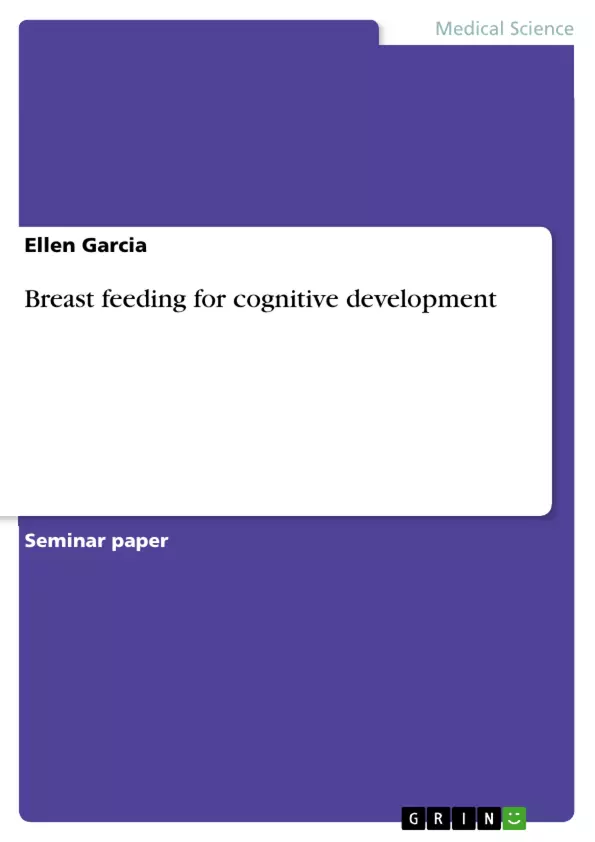As usual, traditions that have been followed for long always form subjects of debate. Traditionally women used to breast feed their infants till the next child is born or at least for a year without any complain. The situation has however changed as mothers now opt for infant formula readily available in our markets. This has raised a serious issue of debate as nutritionists and pediatrics as a whole still recommend six months exclusive breast feeding while manufactures of these products are capitalizing on the fact that today’s mothers are more busy thus has little time for their babies. Breast feeding had traditionally been associated with the development of strong immune system for babies, the single most reason why pediatrics always recommend six months exclusive breast feeding period to mothers. Studies currently have tried to address other reasons why breast feeding should be treated with importance. One of this reasons that has received renowned attention is the connection between breastfeeding and cognitive development. The importance of breast feeding for cognitive development was first explored by Hoefer and Hardy (1929) when they carried out a study on “later development of breast fed and artificially fed infants.” Since then this topic has been researched by many scholars. While most scholars argue that breast fed children ranks high on clinical studies done on cognitive function, others argue that these perceived differences can be attributed to other factors such as maternal education or socio-economic factors (Anderson, 1999). The development of cognitive functions in infants is of course a more complex process being influenced by many factors including genetics as well as environmental factors. The role played by nutrition an in this case breastfeeding cannot be under estimated either. This piece of work therefore seeks to address the role played by breast feeding in cognitive development.
Inhaltsverzeichnis (Table of Contents)
- Review of literature
- Best practices based on evidence scientist
- Suggestions for future research and their feasibility for best practice
Zielsetzung und Themenschwerpunkte (Objectives and Key Themes)
This work aims to explore the relationship between breastfeeding and cognitive development in infants. It reviews existing research to evaluate the impact of breastfeeding on cognitive function, specifically focusing on the development of intellectual capacity. The author also provides recommendations for best practices and suggests areas for future research.- The role of breastfeeding in cognitive development
- The influence of breastfeeding on IQ and cognitive function
- The impact of breastfeeding duration on cognitive outcomes
- Confounding factors influencing the relationship between breastfeeding and cognitive development
- Best practices for promoting breastfeeding and supporting mothers
Zusammenfassung der Kapitel (Chapter Summaries)
Review of literature
The chapter reviews existing literature on the relationship between breastfeeding and cognitive development, highlighting studies that have demonstrated a positive correlation between breastfeeding and intellectual capacity. The author discusses various studies, including those that have controlled for confounding factors such as maternal education and socioeconomic status.Best practices based on evidence scientist
This chapter emphasizes the importance of promoting breastfeeding for at least six months and continuing breastfeeding after weaning. The author emphasizes the role of healthcare professionals in providing accurate information to parents and promoting breastfeeding as a vital practice for infant development.Suggestions for future research and their feasibility for best practice
This chapter calls for further research into the specific mechanisms by which breastfeeding influences neurodevelopment. The author suggests conducting clinical studies to examine the impact of specific nutrients found in breast milk on brain development.Schlüsselwörter (Keywords)
Breastfeeding, cognitive development, infant development, IQ, intellectual capacity, neurodevelopment, best practices, maternal education, socioeconomic status, confounding factors, clinical studies, future research.Frequently Asked Questions
Does breastfeeding improve an infant's cognitive development?
Many studies suggest a positive correlation between breastfeeding and cognitive function, often resulting in higher scores on IQ tests and improved neurodevelopment.
How long should a mother breastfeed for optimal cognitive outcomes?
Pediatricians generally recommend at least six months of exclusive breastfeeding to support the development of the immune system and maximize potential cognitive benefits.
What are confounding factors in breastfeeding research?
Confounding factors are variables like maternal education, socioeconomic status, and genetics, which can also influence a child's IQ and make it difficult to isolate the exact impact of breast milk.
Why is breast milk considered superior to infant formula for brain development?
Breast milk contains specific nutrients, hormones, and long-chain polyunsaturated fatty acids that are essential for brain growth and are difficult to replicate perfectly in formula.
What is the role of healthcare professionals in promoting breastfeeding?
They provide evidence-based information, support mothers in overcoming challenges, and emphasize the long-term benefits of breastfeeding for the child's intellectual capacity.
- Citation du texte
- Ellen Garcia (Auteur), 2012, Breast feeding for cognitive development, Munich, GRIN Verlag, https://www.grin.com/document/271552



